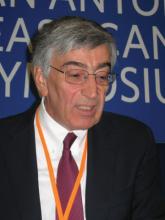SAN ANTONIO – Adding the HER2-directed monoclonal antibody pertuzumab to trastuzumab and docetaxel therapy improves pathologic complete response in the neoadjuvant setting and appears to eradicate some HER2-positive tumors in patients with early breast cancer, investigators have reported.
Pathologic complete response (pCR) at the time of surgery, the primary end point of the study, was 46% with the pertuzumab* (Omnitarg)/trastuzumab (Herceptin)/docetaxel (Taxotere) combination, compared with 29% for trastuzumab/docetaxel alone among women with early HER2–positive
disease.
"What we have observed is a higher pCR rate with trastuzumab and pertuzumab when combined with docetaxel," Dr. Luca Gianni said during a Dec. 10 press briefing. The results were presented at the San Antonio Breast Cancer Symposium.
Pathologic complete response for neoadjuvant pertuzumab and trastuzumab without chemotherapy was 17%. "Efficacy of the trastuzumab/pertuzumab doublet most importantly shows that a proportion of HER2-positive tumors can be eradicated without the need for chemotherapy," said Dr. Gianni, director of medical oncology at the National Cancer Institute, Milan, Italy.
"The results of ... these patients having eradication of the tumor indicates that there is a subset of women who can do without chemotherapy. We don’t know, as of yet, how to identify those women, but if we were able to do so, we would spare [them] the unnecessary toxicity," he said.
The monoclonal antibody pertuzumab is a novel targeted medicine called a HER2 dimerization inhibitor. HER dimerization, or pairing, is thought to play an important role in the growth and formation of several different cancer types. Pertuzumab is the first investigational agent designed to specifically prevent the HER2 receptor from pairing with other HER receptors and may ultimately inhibit cancer cell growth or lead to cancer cell death.
The NEOSPHERE study (Neoadjuvant Study of Pertuzumab and Herceptin in an Early Regimen Evaluation) is a randomized multicenter phase II study that was conducted in 78 centers and involved 417 women with newly diagnosed HER2-positive early, inflammatory, or locally advanced breast cancer who had never received Herceptin.
Patients with operable or locally-advanced/inflammatory HER2-positive breast cancer were included in the study if they had not previously undergone chemotherapy and if their primary tumors were smaller than 2 cm.
The women were randomized to one of four treatments: docetaxel plus trastuzumab (n = 107), docetaxel plus trastuzumab and pertuzumab (n = 107), trastuzumab plus pertuzumab (n = 107), and docetaxel plus pertuzumab (n = 96).
Each group received four cycles of treatment before surgery. Treatment cycles were administered intravenously every 3 weeks. Pertuzumab was administered at an 840-mg loading dose and a 420-mg maintenance dose. Trastuzumab was given at an 8-mg/kg loading dose and a 6-mg/kg maintenance dose. Docetaxel was given at a 75-mg/m2 dose with escalation to a 100-mg/m2 dose if the starting dose was well tolerated.
After surgery all patients received trastuzumab for up to 1 year and three cycles (every 3 weeks) of standard therapy with 5-fluorouracil, epirubicin, and cyclophosphamide (FEC).
Patients in the neoadjuvant trastuzumab/pertuzumab group also received docetaxel before receiving FEC.
Pathologic complete response in the intent-to-treat population was 29% for the trastuzumab/docetaxel group, 46% for trastuzumab/pertuzumab/docetaxel group, 17% for the trastuzumab/pertuzumab group, and 24% for the pertuzumab/docetaxel group.
The difference between pCR for the docetaxel/trastuzumab group and the trastuzumab/pertuzumab group was significant (P = .0198), as were the differences between the docetaxel/trastuzumab group and the docetaxel/trastuzumab/pertuzumab group (P = .0141), and between the docetaxel /trastuzumab/ pertuzumab group and the docetaxel/pertuzumab group (P = .003).
"The tolerability of all combinations was very good," said Dr. Gianni. "When we used the doublet of tumor antibodies, we basically did not observe any grade 3 or higher adverse events."
He noted that there was no clinically meaningful incidence of diarrhea or skin rash with the addition of pertuzumab. There was also a "lack of any meaningful increase in cardiac risk with the addition of pertuzumab over a short course of four cycles of neoadjuvant therapy."
Trastuzumab is approved for the treatment of early-stage breast cancer that is HER2 positive and has spread into the lymph nodes, or is HER2 positive and has not spread into the lymph nodes, but has one high-risk feature. The drug is also indicated for use in metastatic HER2-positive breast cancer and is approved, in combination with chemotherapy, for the treatment of HER2-positive metastatic cancer of the stomach or gastroesophageal junction.
The study was sponsored by F. Hoffmann-La Roche Ltd.
Dr. Gianni reported that he is on the advisory boards for F. Hoffmann-La Roche Ltd., Genentech Inc., GlaxoSmithKline, Boehringer Ingelheim GmbH, and Pfizer Inc.


